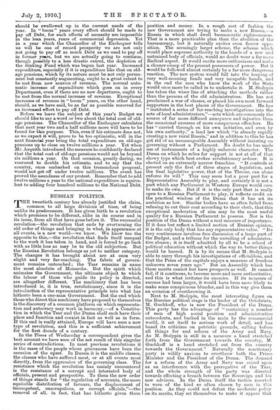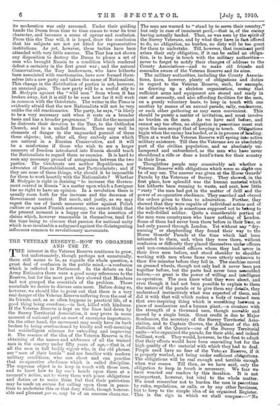RUSSIAN POLITICS. T HE twentieth century has already justified the claim,
common to all large divisions of time, of being unlike its predecessors. It has given birth to a revolution which promises to be different, alike in its course and in its issue, from all that have gone before it. The successful revolution—the revolution that ends by overturning the old order of things and bringing in what, in appearance at all events, is a new world—we know. We know too the opposite to this,—the revolution that finds itself unequal to the work it has taken in hand, and is forced to go back with as little loss as may be to the old subjection. But the Russian Revolution belongs as yet to neither category. The changes it has brought about are at once very slight and very far-reaching. The fabric of govern- ment remains untouched ; the Tsar remains in name the most absolute of Monarchs. But the spirit which animates the Government, the ultimate object to which the labour of those who guide its policy is directed, are altogether different. The machinery that has been introduced is, it is true, revolutionary, since it is the introduction of the representative principle into what has hitherto been a one-man Government. But the end which those who direct this machinery have proposed to themselves is the discovery of a common platform on which representa- tion and autocracy may work in harmony,—of a Constitu- tion in which the Tsar and the Duma shall each have their place and function and coexist in fact as well as in form. If this end is really attained, Europe will have seen a new type of revolution, and this is a sufficient achievement for the first decade of a century.
In the Times of Wednesday a correspondent gives the best account we have seen of the net result of this singular series of contradictions. In most previous revolutions it is the mass of the people whose grievances have been the occasion of the upset. In Russia it is the middle classes, the classes who have suffered most, or at all events most directly, from the oppression of the governing class. The resistance which the revolution has mainly encountered is the resistance of a corrupt and interested body of officials, present and prospective. To them the new order of things stands for " the regulation of accounts, the more equitable distribution of favours, the displacement of incompetent, unscrupulous, or corrupt officials,"—the removal of all, in fact. that has hitherto given them position and money. In a rough sort of fashion the new Government are trying to make a new Russia,—a Russia in which shall dwell bureaucratic righteousness. That is a more practicable plan than the abolition of the bureaucracy, but it naturally excites even fiercer oppo- sition. The seemingly larger scheme, the scheme which would place supreme authority in the hands of a new and untrained body of officials, would no doubt wear a far more Radical aspect. It would excite more enthusiasm and make a cleaner sweep of the present possessors of power. But it would be followed almost certainly by a far more dangerous reaction. The new system would fall into the keeping of very well-mean; g heads and very incapable hands, and in the end the men who know the work of the State would once more be called in to undertake it. M. Stolypin has taken the wiser line of attacking the methods rather than the persons of the old administrators. He has not proclaimed a war of classes, or placed his own most forward supporters in the best places of the Government. He has " instituted a series of far-reaching investigations into the acts of local administrators,"—acts which are commonly the source of far more diffused annoyance and injustice than the occasional excesses of more conspicuous offenders. He has " carried through on his own initiative, and even by his own authority," a land law which "is already rapidly creating a new rural Russia," and in addition to this he has got rid of an unmanageable Assembly without insisting on governing without a Parliament. No doubt he has made use of instruments of a highly unheroic character. The Duma on which he relies for support is not at all of that showy type which best evokes revolutionary ardour. It is elected on an extremely narrow franchise. " It controls at present only the first of three stages of legislation, and the final legislative power, that of the Throne, can alone enforce its will." This may seem but a poor part for a Representative Assembly to play, and certainly it is not a part which any Parliament in Western Europe would care to make its own. But if it is the only part that is really open to a Russian Parliament to play, it reflects credit on the practical wisdom of the Duma that it has set its ambition so low. Similar bodies have so often failed from refusing to cut their coat according to their cloth, that this exceptional moderation of aim may be the most useful quality for a Russian Parliament to possess. Nor is the position of the Duma without a real measure of importance. If it does but reflect a limited section of Russian opinion, it is the only body that has any representative value. " Its very continuance involves free discussion of a large part of the Budget, and a tribune for the unveiling of administra- tive abuses; it is itself admitted by all to be a school of political education without which the way to better things would be barred. It is by its means that M. Stolypin is able to carry through his investigations of officialdom, and that the Press of the capitals enjoys a measure of freedom unknown seven years ago." But an Assembly which has these merits cannot but have prospects as well. It cannot fail, if it continues, to become more and more authoritative, and this is what irritates its enemies. If its measure of success had been larger, it would have been more likely to make some conspicuous blunder, and in this way give them an occasion of overthrowing it.
Next to M. Stolypin, the most interesting figure on the Russian political stage is the leader of the Octobrists, M. Guchkoff, who is now the President of the Duma. This party has the advantage of " containing a number of men of high social position and administrative antecedents, and backed in the main by the commercial world, it set itself to serious work of detail, and has based its criticism on patriotic grounds, calling before all things for real reform of the Army and Navy. As M. Stolypin is still in a measure a hand stretched forth from the Government towards the country, M. Guchkoff is a hand stretched out from the country towards the Government." Naturally the reactionary party is wildly anxious to overthrow both the Prime Minister and the President of the Duma. The demand for a reform of the Army and Navy was seized upon as an interference with the prerogative of the Tsar, and the whole strength of the party was directed towards effecting a breach between the Sovereign and his new advisers. In the Duma itself the tactics resorted to were of the kind so often chosen by men in this position. As they could not defeat the moderate policy on its merits, they set themselves to make it appear that its moderation was only assumed. Under their guiding hands the Duma from time to time ceases to wear its true character, and becomes a scene of uproar and confusion. From this the Tsar will, it is hoped, draw the conclusion that his subjects are not yet fitted for representative institutions. As yet, however, these tactics have been attended with very little success. The Tsar has not shown any disposition to destroy the Duma to please a set of men who brought Russia to a condition which rendered defeat a certainty in the first great war ; and the natural Conservatives, the Tory landowners, who have hitherto been associated with reactionaries, have now formed them- selves into a new party and taken the name of Nationalists. This change in the distribution of parties is not, however, an unmixed gain. The new party will be a useful ally to M. Stolypin against the " wild men " from whom it has broken away, but it is still to be seen how far it will work in common with the Octobrists. The writer in the Timesis evidently afraid that the new Nationalists will not be very unlike the old reactionaries. The party, he says, " is likely to be a very necessary unit when it rests on a broader basis and has a broader programme." But for the moment he distrusts their devotion to the Tsar, to the Orthodox Church, and to a unified Russia. There may well be elements of danger in the unguarded pursuit of these three objects ; but, after all, they embody aims which are natural in a Russian Conservative, and it will be a misfortune if those who wish to see a larger measure of freedom introduced into Russia should teach the Nationalists to regard them as enemies. It is hard to seen any necessary ground of antagonism between the two parties. The Octobrists are neither Republicans, nor advocates of Disestablishment, nor Particularists ; and if they are none of these things, why should it be impossible for them to work heartily with the Nationalists ? Whether M. Stolypin is right in desiring " to increase the Govern- ment control in Russia " is a matter upon which a foreigner has no right to have an opinion. In a revolution there is usually room both for the increase and the decrease of Government control. But much, and justly, as we may regret the use of harsh measures either against Polish culture or against Finnish autonomy, we cannot think that the present moment is a happy one for the assertion of claims which, however reasonable in themselves, tend for the time being to obscure that passion for national unity which is so invaluable a safeguard against the disintegrating influences common to revolutionary movements.



















































 Previous page
Previous page